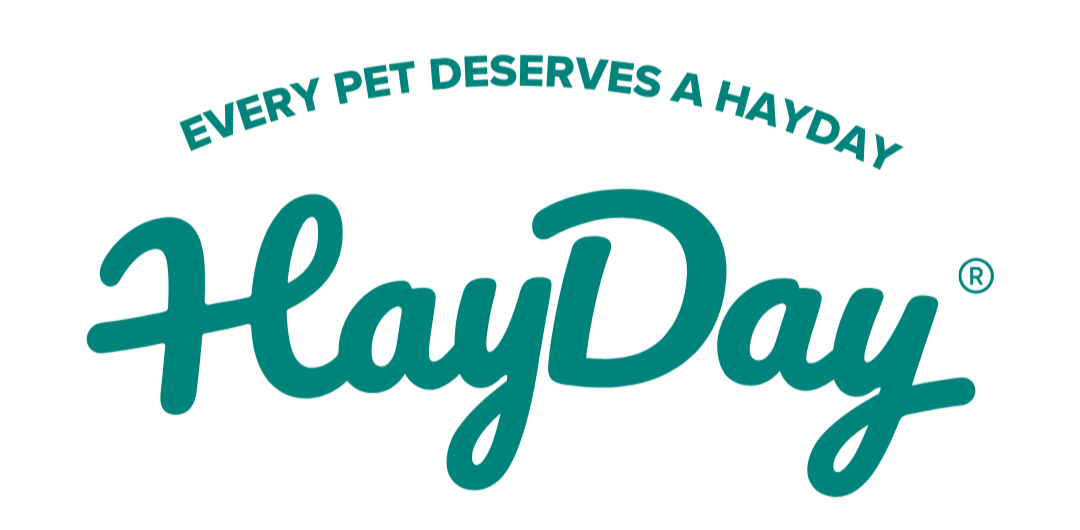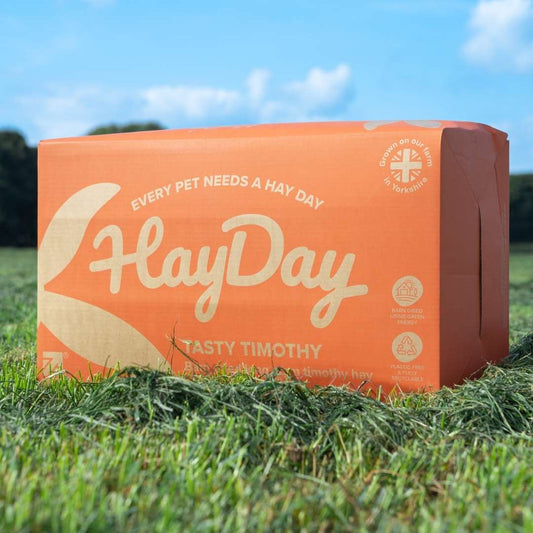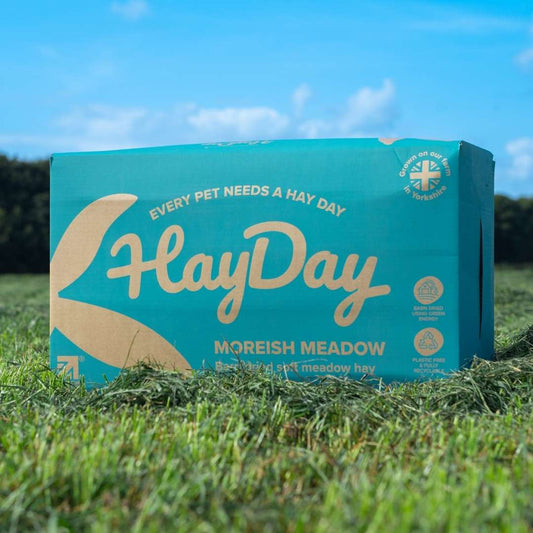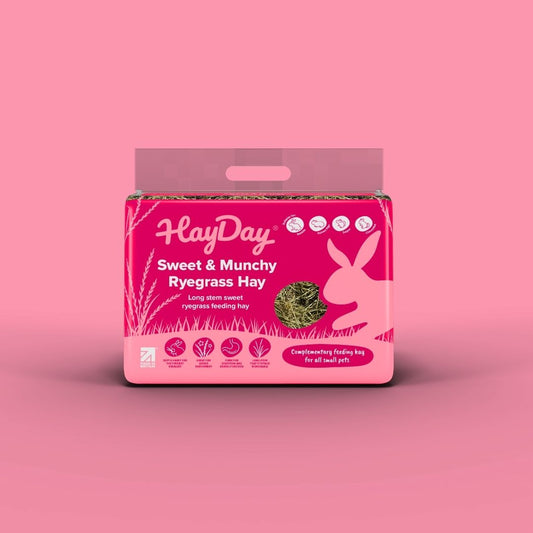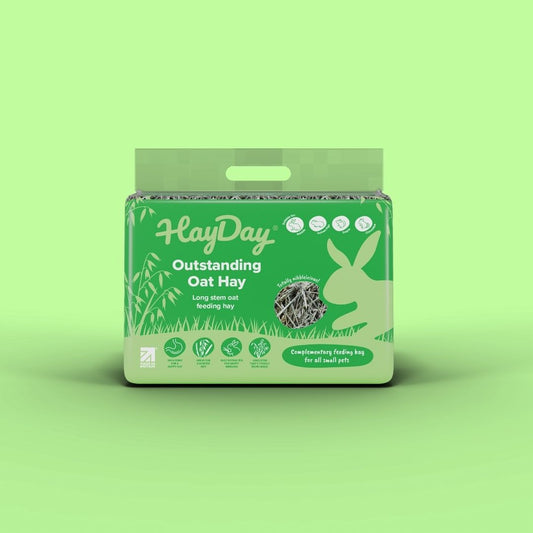Can guinea pigs eat rabbit food? Rabbits and guinea pigs can both eat the same hay, most commonly Timothy, Meadow, Ryegrass and Alfalfa, with hay making up the majority of their diet. However, when it comes to hard feed or pellets this is not always the case. Just switched text around here Ellie to answer the questions quicker other text is just below
Although both are small animals, guinea pigs have specific dietary requirements that some rabbit food fails to meet, particularly the essential vitamin C.
Feeding your guinea pig rabbit food could result in nutritional deficiencies and health risks. This article will delve into the reasons why rabbit food is unsuitable for guinea pigs and cover the ideal diets and choices to maintain their health.
We get asked this question a lot here at HayDay, and this may seem like an obvious question to some, but for pet owners concerned with providing the proper diet for their guinea pigs, we have all the answers.
Shop Guinea pig hay>
Guinea Pigs & Rabbit Food Advice Overview
-
Guinea pigs shouldn’t eat rabbit food due to different nutritional needs. Rabbit food will mainly lack vitamin C, which is essential for guinea pigs’ health.
-
Feeding guinea pigs rabbit food can lead to health issues like scurvy, malnutrition, obesity, and more due to improper nutritional balance.
-
The ideal diet for a guinea pig includes high-quality unlimited amount of hay, water, pellets and a handful of fresh greens and veg (particularly ones high in Vitamin C).

Rabbit Food and Guinea Pig Food Differences
Despite their shared small and adorable size, guinea pigs and rabbits have differing nutritional needs. While rabbit food might seem like a convenient option for your guinea pig, it’s not the best choice from a nutritional standpoint.
The key reason is that rabbit food lacks essential nutrients that guinea pigs require, such as the supplemental vitamin C.
Guinea pigs absorb vitamin B12 from bacteria in their caecum and obtain it when they eat their poop.
What about similarities?
When it comes to food rabbits and guinea pigs can eat, hay comes out on top. Both guinea pigs and rabbits can enjoy common varieties like Timothy hay and Meadow hay.
Timothy hay is an excellent fibre source that supports their digestion and helps wear down their constantly growing teeth.
What's the difference between guinea pig pellets and rabbit pellets?
Again, Guinea pig pellets and rabbit pellets are both formulated to meet the specific dietary needs of these animals, but they differ significantly in their nutritional composition due to the distinct requirements of each species.
Vitamin C: Vital for Guinea Pigs
This vital vitamin significantly impacts their health, aiding in the regular development and upkeep of skin, joints, and mucosal surfaces.
So, how much vitamin C does your guinea pig need?
The answer is, just enough, in order to prevent diseases like scurvy (the vitamin C requirement of an adult, non-breeding guinea pig is 10 mg/kg/day). Fresh greens is also a good way of guinea pigs getting a sufficient amount of Vitamin C as they're high in it! For example dandelion greens contain around 35mg of vitamin C per 100g and lettuce around 24g per 100g.
Scurvy: A Result of Vitamin C Deficiency
Scurvy, a severe disease, can develop in guinea pigs when their intake of vitamin C is insufficient. This condition affects their blood vessels and can lead to symptoms such as:
-
Poor coat condition
-
Slow wound healing
-
Reduced appetite
-
Weight loss
-
Lethargy
If you suspect your guinea pig may have scurvy, it is important to consult a veterinarian for proper diagnosis and treatment based on the latest veterinarian research.
If a guinea pig is continually fed rabbit pellets, they might end up developing symptoms of scurvy, such as:
-
Loss of appetite
-
Weight loss
-
Diarrhoea
-
A rough coat
-
Swollen joints
-
Bleeding gums
Protein and Fibre: Balancing the Diet
In terms of protein and fibre, guinea pigs need a distinct balance compared to rabbits. Guinea pigs need:
-
A protein content of around 16-20% in fresh guinea pig pellets, with a minimum of 3.0 Mcal ME/kg (12.5 MJ ME/kg)
-
Protein provides essential nutrients for growth and maintaining their health
-
A deficiency in protein might lead to weight loss and could signify illness.
On the other hand, fibre is also super important for guinea pigs’ digestion.
A diet high in fibre, adequate protein intake, and essential vitamins and minerals meets guinea pigs’ nutritional requirements. Unfortunately, rabbit food doesn’t meet these requirements.
Shop now high protein and high fibre guinea pig hay >.
Fat Digestion: Meeting Guinea Pig Needs
Much like protein and fibre, fat digestion is also a realm where the needs of guinea pigs and rabbits diverge considerably. Guinea pigs require an optimal amount of fat in their diet to meet their specific needs.
If a guinea pig’s diet is too high in fat, it can lead to various health issues such as:
-
Obesity
-
Digestive problems
-
Liver disease
-
Heart disease
It is important to provide a balanced diet for guinea pigs, ensuring they get the right amount of fat to keep them healthy, as guinea pigs eat various types of food.
Excessive fat intake can result in:
-
Dyslipidemia
-
Glucose intolerance
-
Damage to vital organs
-
Lethargy
-
Weakness
-
Co-morbidities such as heart disease, hepatic lipidosis, ketosis, and toxaemia
Among the beneficial fats for guinea pigs is linoleic acid, which should make up about 1% of their calories.
Malnutrition and Energy Loss
Guinea pigs also risk malnutrition and energy loss when they are fed rabbit food, as some people might mistakenly believe that pigs eat rabbit food.
Guinea pigs require a diet containing around 16-18% protein. Rabbit food, however, falls short of this requirement.
If guinea pigs fail to get enough protein, they might experience a drop in energy levels as they begin to break down their fat stores for energy.
While it is possible for guinea pigs to recover from malnutrition caused by a diet of rabbit food, it’s best to feed them a diet that meets their specific nutritional needs from the start.
Ideal Guinea Pig Diet: What You Should Feed Them
Having discussed the risks of feeding your guinea pig rabbit food, you might be curious about their ideal diet. The answer is a balanced diet that includes high-quality pellets, unlimited amounts of hay, and vitamin C-rich fruit and vegetables such as:
High-quality pellets are a crucial part of a guinea pig’s diet, providing essential vitamins and minerals.
Hay, particularly Timothy hay, is essential for their digestion and dental health. Additionally, fresh vegetables rich in vitamin C can help boost your guinea pig’s overall health and prevent deficiencies.
Order your high quality, barn dried hay for guinea pigs online now.
High-Quality Guinea Pig Pellets: The Foundation
Pellets form the basis of a guinea pig’s diet. These high-quality feeds usually contain:
-
around 14.0% crude protein
-
at least 2.0% crude fat
-
at least 25.0% crude fibre
-
at least 0.4% calcium
-
essential vitamins and minerals like stabilised Vitamin C
Unlimited Hay: Essential for Digestion
Hay is one of the key components in a guinea pig’s diet.
Hay is essential for a guinea pig’s digestion because it provides the high fibre content that their complex digestive system needs. It also helps maintain and wear down their ever-growing teeth from growing too long.
Without enough hay, guinea pigs can become overweight and suffer from dental and digestive issues.
Therefore, it’s essential to provide your guinea pig with unlimited access to hay. If you notice signs of overgrown teeth or risk of GI Stasis, it might indicate your guinea pig isn’t getting enough hay. We would always recommend that you seek the advise of a vet, if this is the case.
Why not try our premium quality barn dried hay, suitable for small pets? Click here now >

Vitamin C-Rich Vegetables: Boosting Health
Vegetables are another essential part of a guinea pig’s diet.
Guinea pigs can munch on vitamin C-rich vegetables like:
-
Kale - To be fed in moderation
-
Parsnips
-
Spinach - To be fed in moderation
-
Bell peppers - High in Vitamin C
-
Pak Choi
-
Watercress
To see the full list of guinea pig safe herbs, veg and fruit - read more helpful advice across on the PDSA.
Guinea Pigs and Rabbits: Companionship
A common topic is the relationship between these small pets: guinea pig and rabbit companionship can sometimes be friendly, but since their diets are different, mixing their food should be avoided. It’s also worth addressing if guinea pigs can eat hay as a staple diet, and indeed, unlimited hay is essential for their digestive system
Summary
The key takeaway from this blog is that guinea pigs, like most small pets, have unique nutritional requirements that need to be met for them to stay healthy.
Remember to feed your guinea pigs a diet of high-quality pellets, unlimited hay, and vitamin C-rich vegetables, and consult with your local vet or nutritionist regularly to keep up to date with the latest in guinea pig nutrition.
It's also important to check your guinea pigs weight and weigh them regularly. Changes in your guinea pig’s weight can be an indicator of health issues and should also be addressed with your vet.
Frequently Asked Questions
Can I use rabbit hay for guinea pigs?
Yes, you can use rabbit hay for guinea pigs and other small animals, as they eat the same hay. Popular hay choices include Timothy hay, Meadow and/or Alfalfa Hay.
